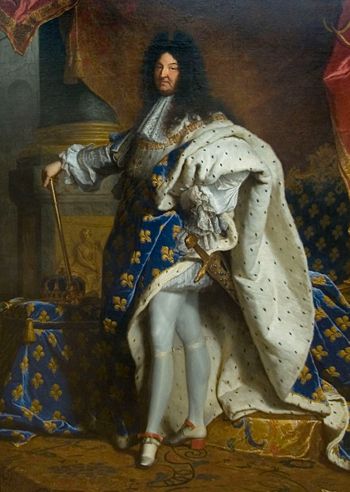Louis XIV: Difference between revisions
imported>Charles Sandberg (typo) |
imported>Charles Sandberg No edit summary |
||
| Line 6: | Line 6: | ||
===Early Life=== | ===Early Life=== | ||
Louis XIV was born to [[Louis XIII]] and [[Anne of Austria]] at the royal Château Saint-Germain-en-Laye on September 5, 1638 and was christened Louis Dieudonné ("gift of God"}, as his parents had been childless for twenty-two years. He succeeded his father on the throne at the age of four on May, 14 1643. His mother served as a regent, ruling France in in his place with the assistance of Italian-born [[Cardinal Mazarin]], who had been chief minister and tutor of five-year-old Louis. In 1648, the [[Thirty Years' War]] was brought to a successful conclusion in the [[Peace of Westphalia]] by Mazarin, severely weakening the [[Holy Roman Empire]] and the [[Habsburg]]s. In the closing years of the Thirty Years' War, the [[Fronde]] (1648-53) broke out, in which the | Louis XIV was born to [[Louis XIII]] and [[Anne of Austria]] at the royal Château Saint-Germain-en-Laye on September 5, 1638 and was christened Louis Dieudonné ("gift of God"}, as his parents had been childless for twenty-two years. Although being of divine faith, he was a neglected child and was kept under the care of servants. He succeeded his father on the throne at the age of four on May, 14 1643. His mother served as a regent, ruling France in in his place with the assistance of Italian-born [[Cardinal Mazarin]], who had been chief minister and tutor of five-year-old Louis. In 1648, the [[Thirty Years' War]] was brought to a successful conclusion in the [[Peace of Westphalia]] by Mazarin, severely weakening the [[Holy Roman Empire]] and the [[Habsburg]]s. In the closing years of the Thirty Years' War, the [[Fronde]] (1648-53) broke out, in which the aristocrats of [[Paris]] launched a major revolt in reaction the policies of centralization pursued by [[Cardinal Richelieu]] and Mazarin. Louis, nine-years-old at the time, faced hunger, poverty, fear, and misfortune during the revolts. The revolts caused the young king to develop a fear of rebellion that he would keep for the rest of his life. He also would never forgive Paris and the nobles and would live in the royal palace of Versailles outside of Paris for much of his reign. | ||
Mazarin, having been victorious over the rebels in 1653, sought to teach the young king his knowledge of foreign policies and diplomatic relations. The Thirty Years' War had ended for the most part, except for the war between [[France]] and [[Spain]], whose outcome would transfer hegemony from the Habsburgs to the Bourbons. In 1658, Louis had fallen in love with Mazarin's niece, Marie Mancini. But he instead married for diplomatic reasons, marrying [[Marie-Thérèse]], daughter of the king of Spain, in 1660 in order to bring peace to the two warring countries. | |||
===King=== | ===King=== | ||
Revision as of 21:43, 3 November 2007
Louis XIV (1638-1715), also known as The Sun King (Roi du soleil) or Louis the Great, was the king of France from 1643 to 1715. The third monarch of the Bourbon family, Louis ruled France for 72 years, the longest reign in European history, and dominated European cultural and political affairs. During his reign, Louis typified the absolute monarchy of the Neoclassical age, established a sumptuous court at Versailles, and fought most of Europe in four wars. Louis XIV dominated French culture by gaining international recognition of French arts, literature, and science, drastically changing the country from its former Medieval ways into a more refined, sophisticated style of life.
Biography
Early Life
Louis XIV was born to Louis XIII and Anne of Austria at the royal Château Saint-Germain-en-Laye on September 5, 1638 and was christened Louis Dieudonné ("gift of God"}, as his parents had been childless for twenty-two years. Although being of divine faith, he was a neglected child and was kept under the care of servants. He succeeded his father on the throne at the age of four on May, 14 1643. His mother served as a regent, ruling France in in his place with the assistance of Italian-born Cardinal Mazarin, who had been chief minister and tutor of five-year-old Louis. In 1648, the Thirty Years' War was brought to a successful conclusion in the Peace of Westphalia by Mazarin, severely weakening the Holy Roman Empire and the Habsburgs. In the closing years of the Thirty Years' War, the Fronde (1648-53) broke out, in which the aristocrats of Paris launched a major revolt in reaction the policies of centralization pursued by Cardinal Richelieu and Mazarin. Louis, nine-years-old at the time, faced hunger, poverty, fear, and misfortune during the revolts. The revolts caused the young king to develop a fear of rebellion that he would keep for the rest of his life. He also would never forgive Paris and the nobles and would live in the royal palace of Versailles outside of Paris for much of his reign.
Mazarin, having been victorious over the rebels in 1653, sought to teach the young king his knowledge of foreign policies and diplomatic relations. The Thirty Years' War had ended for the most part, except for the war between France and Spain, whose outcome would transfer hegemony from the Habsburgs to the Bourbons. In 1658, Louis had fallen in love with Mazarin's niece, Marie Mancini. But he instead married for diplomatic reasons, marrying Marie-Thérèse, daughter of the king of Spain, in 1660 in order to bring peace to the two warring countries.
